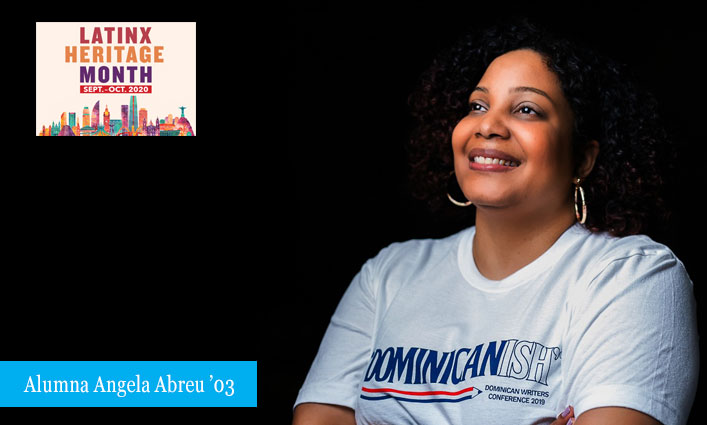
“It’s so important for us Latinos to know that our stories are worthy of being told. Our stories matter.” —Angela Abreu
Alumna Angela Abreu ’03 is on a mission to change the literary landscape. As Founder and Creative Director of the Dominican Writers Association, she’s uplifting the next generation of Dominican writers, by providing them with the resources they need to produce transformative works. As she highlights and celebrates these Latinx narratives, she’s helping Latinx readers, see their experiences, culture, and histories, reflected in the stories they read. “I wasn’t aware of any Latino, let alone Dominican, authors up until I was 21 years old. No one had ever taught me about these writers; I had never heard of their stories,” says Abreu. “At the Dominican Writers Association, we’re committed to producing and promoting works that reflect our people. I get excited to see these Latino stories being published each and every day, because we’re finally being represented in the stories that we read. It’s so important for us Latinos to know that our stories are worthy of being told. Our stories matter.”
“Books were my everything. They were my escape to adventure and inspired my love for reading and writing.” —Angela Abreu
Falling in Love with Reading
Growing up in Washington Heights—a neighborhood in Manhattan and the center of the Dominican diaspora—Abreu lived in a tiny apartment with her mother and two younger brothers. “My mother was a single mom raising three kids on her own in New York City, during the ’90s crack epidemic,” says Abreu, who moved from the Dominican Republic to New York when she was three years old. “She worked all the time and was very strict with us. There were no sleepovers, there was no hanging out after school, and when we got home, we had to immediately call her at work and let her know we were there,” recalls Abreu. “So, one of the things I would do to pass the time was read.” At school Abreu’s love for the written word only grew deeper. “My favorite day of the school year was the day of the Scholastic Book Fair. I remember seeing all the different variety of books and thinking, Oh my god, I’m in heaven. Books were my everything. They were my escape to adventure and inspired my love for reading and writing.”

“Up until that moment in my life, I was never made aware of, and no one had ever taught me, about Latino authors, let alone Dominican authors.” —Angela Abreu
Coming to John Jay
After high school, Abreu dreamed of a career in the mental health field. While looking into some programs, she found her way to John Jay. “Initially I wanted to be a nurse, but math and science were not my thing and I began doing some research. The Forensic Psychology program at John Jay really caught my attention,” says Abreu. But it was a creative writing course she took during her final semester, that would have the most life-changing impact on Abreu. As part of an assignment, she wrote a number of short stories that referenced Dominican culture and traditions, but her professor didn’t fully understand her point of view. “I remember thinking, I can’t possibly be the only one writing these types of stories. So, I went home that day and googled Dominican writers. I came across Angie Cruz, Julia Alvarez, and Junot Diaz. And, that’s when it hit me. Up until that moment in my life, I was never made aware of, and no one had ever taught me, about Latino authors, let alone Dominican authors.” The realization that Latinx narratives were missing from her own education and life floored Abreu. “I took it upon myself to start reading all these stories, and then I started sharing them with others. Then I began hosting open mic poetry readings from my apartment and invited all the Dominican writers I knew to come share their stories. That’s how the Dominican Writers Association was born.”

“Representation matters, especially when you’re young. If students don’t feel or see themselves reflected in what they’re reading, if they can’t connect to the writing, they’re going to check out.” —Angela Abreu
Creating a Space for Dominican Writers
The Dominican Writers Association initially began in 2015 as an Instagram page, celebrating any Dominican who was in the field of writing. Since then it’s grown to include the publishing, launching and marketing of books and anthologies by Dominican writers. The Association also produces writing conferences and hosts book talks, writing workshops, and YouTube events. “I’ve been able to expand the platform because I listened to writers, I listened to our audience, and I know what I resources I would want as a writer.” Aside from promoting and supporting the works of Dominican authors, the Dominican Writers Association works extensively with writers to ready them for the tough publishing industry. “We share so many resources and tools with our writers so they can feel confident enough to go to a literary agent or straight to a publisher, or to even self-publish,” says Abreu. “We partner with literary agents and publishing houses to come do manuscript reviews for the writers we work with. We host panel discussions on writing, on how to get published, how to find an illustrator, and highlighting the obstacles we face as Latino writers. We want to help educate Dominican writers and show them how they can get their stories out into the world.”
“No one should have to wait until their 20s to discover that books, by us and for us, exist. That’s what I’m trying to change.” —Angela Abreu
Diversifying Published Narratives
One of the biggest obstacles Latinx writers face in the publishing world is that most of the industry doesn’t understand Latinx cultures, see the value in Latinx stories, or see Latinx people as its best audience. “There’s this belief that Latinx people don’t read, but that’s not the case at all. What publishers need to understand is that the relationship with literature has long been a disconnected one for Latinos,” explains Abreu, pointing to how early that disconnection happens. “Representation matters, especially when you’re young. If students don’t feel or see themselves reflected in what they’re reading, if they can’t connect to the writing, they’re going to check out. This is why you start to lose readers at the ages of 11 or 12 years old, because they’re not connecting to the literature.”
Offering a possible solution, Abreu suggests publishing companies diversify their staff to help them better understand and promote Latinx narratives. “A recent survey found that 76 percent of the publishing industry, from interns to the executive level, are white. When the majority of publishers are white, and they don’t understand your experiences and the diversity in your stories, it can often feel like your stories don’t matter. It can make you feel like your stories aren’t worth telling because you’re not finding yourself in these pages you’re reading,” says Abreu. “What publishers need to do is hire a more diverse staff that can understand these different stories; they’ll understand the characters because they identify with them or connect them with someone in their life.”

“When we share our story, we educate others and we empower our people.” —Angela Abreu
Empowering the Next Generation
Looking at the future, Abreu has big goals for the Dominican Writers Association. “I want the Dominican Writers Association to be like the godparent of every Dominican author,” says Abreu. “I want every publisher who publishes a Dominican author to feel that they need and can ask for our support.” As the Association works its way to that goal, it continues to expand its reach to Latinx readers. It’s recent partnership with oneKIN, a curated online marketplace that promotes brands owned by people of color, will see it produce curated literary boxes for children and young adults. “We want to introduce a new generation of readers to Dominican authors,” says Abreu. “No one should have to wait until their 20s to discover that books, by us and for us, exist. That’s what I’m trying to change. Our experiences as Latinos are unique to us. When we share our story, we educate others and we empower our people. So, to all my writers out there, please continue to write. Give readers insight into our cultures, into our histories, and into our lives. Share your story because I promise you, your story matters.”



